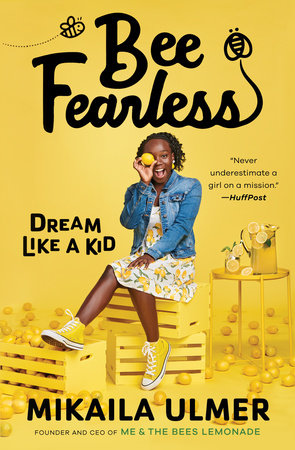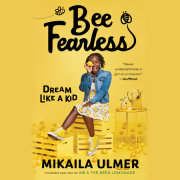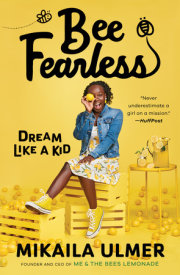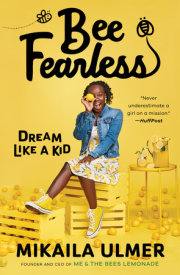Introduction
When I was four and a half years old, I got my first bee sting. Ouch! I don’t know if you’ve ever been stung by a bee, but it hurts. My parents put a little aloe on it, and the pain eventually went away. Then, a week later, I got stung again! I didn’t know what was going on, but I decided I was never going outside again, because I was afraid if I did, I’d get stung by another bee. My parents said, “You can’t stay inside forever.” Instead of fearing the bees, my parents encouraged me to find out more about them and why they sting. I learned that bees sting when they’re scared, and they’re trying to protect themselves against big creatures like four-year-old girls. But I learned something else—more than just about bee stings. The bees were in trouble: They were disappearing at an alarming rate, and they needed our help. I didn’t quite understand the full story at that age, but I decided to set up a lemonade stand outside my house to raise money to protect the bees. I got a little creative and decided to sweeten my lemonade with honey, since bees make honey.
Within a few years, I was bottling my lemonade and selling it in a few stores in Austin, Texas, where I live. A few more years later, my lemonade stand, along with my mission to save the bees, had grown into a multimillion-dollar social enterprise. Now my lemonade is available nationwide in over 1,500 stores. Since starting my company in 2009, I’ve sold over 1.2 million bottles of lemonade. In that time, I have saved an estimated 800,000 bees, with a target of saving an additional 400,000 bees by the end of 2020. That’s a lot of happy bees!
I want to share with you my story of how my simple lemonade stand grew into a successful national business.
This book is about more than just how I built a lemonade company and why you should save the bees. It’s about how to gain the confidence to build a business from the ground up, to take on a problem in our society, to get in front of people and advocate for what you believe in. To be charitable in action, not just talk. It’s about how to be a beautifully mindful entrepreneur.
I’ve learned the things that make a great entrepreneur are qualities that come naturally to kids. We dream big. We don’t see obstacles, but we do see opportunity. We dream about things that don’t even exist yet. And we believe in the future. Kids are quite possibly the biggest dreamers of all. We jump out of bed in the morning and have the wildest ideas. We grab our notebooks, write them down, and figure out how to make them real. If you come up with a good idea and work hard, you can be successful. That’s what our parents tell us. That’s what our teachers tell us. And so that’s what we tell ourselves.
We believe in the impossible. We see possibilities where adults see problems. Like a lot of dreams, I didn’t see mine coming. I didn’t have any experience running a beverage company; neither did my parents or my two brothers—my older brother, Khalil, and my younger brother, Jacob. But I did know that I wanted to protect the bees from going extinct through my lemonade stand, and I was going to make it happen.
Here’s where it gets a little scary: How do you learn to run a business? It’s not just talking about passion and creativity and dreams. It’s about real things like the markets and banks, buyers and sellers, investors and debt, marketing and branding—in other words, there’s a whole lot more to running a business than I ever thought. And it gets even scarier. It’s also about making really big decisions and taking risks.
But here’s where it’s not scary: If you say to yourself, How hard is it to start a business? Your answer should always be, Starting a business is not hard when you’re having fun. Then ask, Why am I starting a business? Your answer should be, Because I believe it will make the world better. So why not start now?
My goal for this book is to show you how. I truly believe there is no age restriction for who can impact the world in positive ways. Even kids can solve all sorts of very big problems. And with the power of technology that generations before us invented, our generation and future generations have more opportunities than ever to research, learn, connect, and spread our messages and our missions around the world.
When you’re having fun, learning something new, and doing something for the right reasons, you’re being creative and meeting people and putting your energy to good use. Nothing can stop you when you’re doing something you love.
So why am I, a fifteen-year-old girl from Austin, Texas, writing a book about business? Because I know that if we all go out in this world looking together at the possibilities of things rather than just the problems, our future will be a whole lot brighter by the time we’re the average age of a CEO.
So . . . let’s bee-gin!
Chapter One
Bee Stings
A lot of people ask me how I started my business. Did you just decide to set up a lemonade stand? The answer is yes, I did just decide to set up a lemonade stand, but a lot of steps came before that.
It all started in a faraway land called Austin, Texas. At just four years old, while I was touring my soon-to-be kindergarten at Trinity Episcopal School, one of the teachers was showing me various classrooms at the elementary and middle school, and I remember thinking everything felt so big and new and shiny compared to my preschool, which was a small, dated building with only a couple classrooms. On one of the benches outside the library sat a colorful flyer advertising a business fair.
“Hey, what’s that say?” I said to my mom. I was always asking my parents questions.
She looked at the flyer and casually said, “That’s something called Acton Children’s Business Fair.”
“That sounds fun. I like fairs,” I said with a smile.
“Would you want to sign up for that?” my mom asked with a little more interest. The only requirement was that I had to be at least four years old. I was four and a half years old, so I qualified.
I said, “Yes, Mommy, I want to do that!” Then I paused and thought about it. “What’s a business fair?” I knew what a fair was, but I didn’t really know what they meant by business. “Will there be rides and games?”
“No, probably not.” She laughed. “It’s a different kind of fair.” She explained in basic terms what a business was and how the fair might be organized.
“So I would sell something at the fair?” I kind of understood.
“Yes,” she said.
“Okay! Let’s sign up.”
When we got home from the school tour that day, my mom and I registered online for the fair. And she wrote the date of the fair on the family calendar in big red ink. The one rule about the family calendar is that when it goes up, we can’t forget about it. Although we did have enough time to forget about it, since it was five months away, in September, it still felt like not enough time to figure out what I was going to sell.
I decided that over the summer I would test out some business ideas. One day I thought I would create something fun and pretty for people to buy, so I searched for flowers in our garden and then took Play-Doh, rolled them into balls with the flowers, and tried to sell them. After grabbing my little craft table and chair from my room, I sat and waited on my front lawn for customers. As you can imagine, it didn’t go very well, but I did learn that in order to sell your product, it needs to be a product that people want to buy. So I thought about selling my drawings, or even making bracelets. Everyone likes to buy bracelets—maybe people would buy my product! I was getting somewhere. Everywhere I went, I came up with ideas of new things to sell. Slime with glitter, painted rocks, lip balm that maybe my parents would let me wear (because I wasn’t allowed to wear lip gloss or lipstick yet).
I would continue to test out new ideas and figure out exactly what I was going to sell.
This is where the bees came in.
Copyright © 2020 by Mikaila Ulmer. All rights reserved. No part of this excerpt may be reproduced or reprinted without permission in writing from the publisher.







